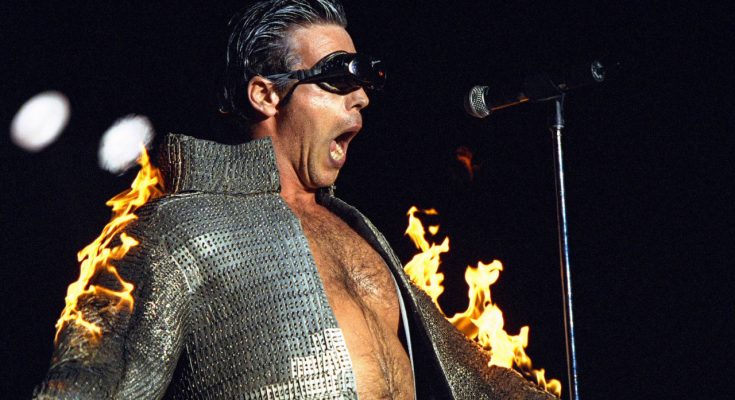He stands on the stage not merely as a singer but as a force of nature, a thunderous storm embodied in flesh: Till Lindemann, the iron voice of industrial power. From his birth in Leipzig on January 4, 1963, through the Cold War years and the fractured landscape of German reunification, to his ascendency at the front of Rammstein and ventures beyond, he has forged an identity that is at once brutal, poetic, merciless, and delicate. The paradox at his core — that one who roars like a juggernaut may also whisper like a dreamer — is what gives him his power.
Language and voice are his weapons. His low, resonant baritone resounds like steel cables vibrating under tension; he modulates it, torments it, bends it until it cracks, moans, rages. That voice does not merely sing; it exerts pressure — it sculpts the air, tilts the bones beneath. He articulates in guttural consonants, rolled “r”s, throaty glottal stops and sibilants that hiss and spit. The textures of his voice are jagged: sometimes clipped and percussive, sometimes long, wavering, and drawn out. He is not a technician in the polished sense; he is an instrument unto himself, a raw amplifier of human extremes.
Yet for all its rawness, his voice is disciplined: capable of nuance, of subtlety, of softness amid the violence. In quieter segments — introspective, melancholy, hushed — he draws us closer, rendering each syllable as though it were a wound, each breath a confession. And then the machinery returns: crashing guitars, pounding drums, synthesizers like electricity arcing overhead — and his voice is the lightning strike that cleaves the night.
In performance, he becomes pyrotechnic flesh. He is a qualified pyrotechnician and famously studied the craft, immersed in the very mechanics of flame, fire, and controlled destruction. After an early stage accident in 1996, when a burning prop fell into the audience, Rammstein resolved to raise the stakes: their shows would become a spectacle of controlled danger. He learned to work with flame, with smoke, with explosions, integrating them into his presence so that his voice and the fire operate in tandem. But the spectacle is never gratuitous: it reinforces the lyrical world he inhabits — a world of metaphors steeped in industrial decay, primal instincts, pain, taboo, loss, and yearning.
Till Lindemann is also a poet in the deepest sense. From early on he composed fragments, lines, images. In 2002 he published Messer (Knife), a collection of poems, and later followed with In stillen Nächten (In Quiet Nights). (IMDb) His poems are unsettling, visceral, often suggestive of violence, longing, the erotic, the fatal, the fractured psyche. He writes about bodies, decay, desire, metamorphosis, the line between pain and pleasure. His imagery is spare yet brutal, compressed like forged steel, yet with enough fissure for shadows to breathe through. These same qualities bleed into his lyrics for Rammstein, where lines can be blunt as axes or delicate as a broken thread.
He inhabits the tradition of German poetic darkness — of expressionism, of abrupt metaphors, of a carnality that does not flinch. But he gives it to us through a voice that roars over industrial percussion, over a musical engine built from distortion, rumble, synthetic pulse. The pairing of such evocative language with such near-military machinery is his defining alchemy.
His path to this voice was not straightforward. As a youth he trained in swimming and once nearly competed at an international level, before injury and choices diverted him. (lindemannworld.com) He worked odd jobs—basket weaving, carpentry, gallery technician—crafting with hands as much as with voice. ) He played drums in a punk band called First Arsch (an early collaboration with future Rammstein members) and dabbled in underground scenes. (Louder) In 1994 he joined the group that would become Rammstein, bringing to it a vision of theatrical force. (Louder) From the ground up he shaped the stagecraft, the visuals, the harsh consonant-shock of the lyrics.
Rammstein: the titan he would ride. Over decades, the six‑member act forged a reputation not merely as a metal band, but as a Gesamtkunstwerk — a total art installation combining sound, light, costume, video, stage theatrics, taboo, shock, narrative. He stands at the center not as showman but as oracle, the voice articulating the fissures in modern life: alienation, desire, death, nationalism, technology, repression, ecstasy. Under his leadership the band operates like a disciplined unit — rigid, almost militaristic in decision-making. Yet ironically, he has at times described the band as a corset that asphyxiates — a beautiful constraint of art and identity. (Louder) His voice is inseparable from that collective, yet it also aspires beyond it.
Around 2014 he launched a side project, Lindemann, with Swedish multi-instrumentalist Peter Tägtgren. Together they released Skills in Pills (2015) and F & M (2019). (Wikipedia) That project allowed him to experiment — singing in English, pushing further into electronic terrain, embracing new textures and collaborations. In 2020 Tägtgren departed; Till then continued under his own name, releasing solo work and singles, exploring cover reinterpretations and extending the terrain of his voice and vision. (Wikipedia)
Throughout all of it, controversy has sometimes shadowed him, as is inevitable when one works so close to the boundaries: issues of consent, spectacle, provocation, power, and mythology swirl around him. But the central fact remains: his work evokes in us a crucible — it burns, scars, clarifies.
To hear him live is to stand in the crater of a volcano. The stage becomes a battlefield of sound and light. He crouches, pounds his thigh with his fist in time to the riffs, puts his body into the fight. (IMDb) Flames erupt, jets of fire snap in arcs, the air roars. In that moment, his voice is the hand that grasps your spine and shakes. You feel danger, exhilaration, dread, catharsis, vulnerability — all mixed in one thermonuclear rush.
Yet even as the spectacle towers, the core remains a human voice seeking communion with violence and beauty, with the abyss and with redemption. He is both the hammer and the wound, the lightning and the scar. His is a voice that compels, repels, seduces, and confronts. It is an iron voice — unbending, unrepentant, irreducible — and it speaks poetry in fire.



